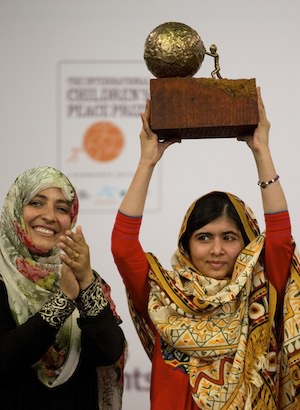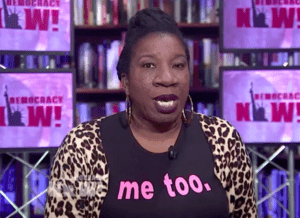‘I Really Hope Malala Doesn’t Win the Nobel Peace Prize’
Though Malala Yousafzai has "stood up and given voice to a cause that needs it," giving her the prize this early in her campaign to bring education to girls around the world may corrupt her attempts to do just that, Dhiya Kuriakose, a young woman from India, writes at The Guardian.
Though Malala Yousafzai has “stood up and given voice to a cause that needs it,” giving her the prize this early in her campaign to bring education to girls around the world may corrupt her attempts to do just that, Dhiya Kuriakose, a young woman from India, writes at The Guardian on Thursday.
Americans have the opportunity to know perhaps better than the citizens of any other country what happens to children who receive excesses of praise and admiration in public. Yousafzai is not Miley Cyrus. But it seems reasonable to assume that the forces that distort Cyrus and many other child celebrities — the relentless flash of cameras, attention from Oprah, and a parade of institutional accolades — can have the same effect when their targets are famous for struggling against human rights abuses.
Kuriakose explains: “As a Nobel-winner, Malala would get lost in giving speeches and collecting further honors. By the time she would emerge at the end of her term as the new laureate, would the interest and attention in her original aspirations still burn as bright? One year after her shooting, with a book and major prize nominations, everyone cares. Four years from now, Malala will still be fighting for the cause, but who will listen then?”
There is also concern that awarding her the prize may deprive other, lesser-known champions of causes the attention that their campaigns need.
“I still am filled with admiration for her,” Kuriakose says, “but giving her the prize now would be a disservice to her and to the many struggles around the world that desperately need the attention Malala already has. The peace prize, in the most basic way, brings recognition and a spotlight. Malala’s story already has the fame and the platform it needs, not to mention financial support. The stories of goodwill from around the world during her hospitalization and recovery were heartening. No matter what happens, the world knows her and is listening. She will have no trouble finding support of all kinds.”
“The Nobel Peace Prize is most effective when it highlights a lengthy struggle or the work of a person or group that have not got due recognition,” Kuriakose continues. “Recall what happened when Muhammad Yunus and the Grameen Bank won in 2006. That single award did more to legitimize microfinance on a world stage than anything else. It brought in funders and persuaded large banks to look at partnerships with Grameen and others to help move the project forward.”
“I am a young woman from India who knows how hard education is for girls to get in many parts of the world,” Kuriakose concludes. “I also believe more than anything that women’s education is what will take the Indian subcontinent forward. Because I also care so much about Malala’s cause, I think it would harm it to honor her so soon. And how sadly ironic it would be if, by making Malala the celebrity mouthpiece for women’s education and putting her on every magazine cover and every TV show, we took away her own chance to go to school.”
— Posted by Alexander Reed Kelly.
Your support matters…Independent journalism is under threat and overshadowed by heavily funded mainstream media.
You can help level the playing field. Become a member.
Your tax-deductible contribution keeps us digging beneath the headlines to give you thought-provoking, investigative reporting and analysis that unearths what's really happening- without compromise.
Give today to support our courageous, independent journalists.






You need to be a supporter to comment.
There are currently no responses to this article.
Be the first to respond.